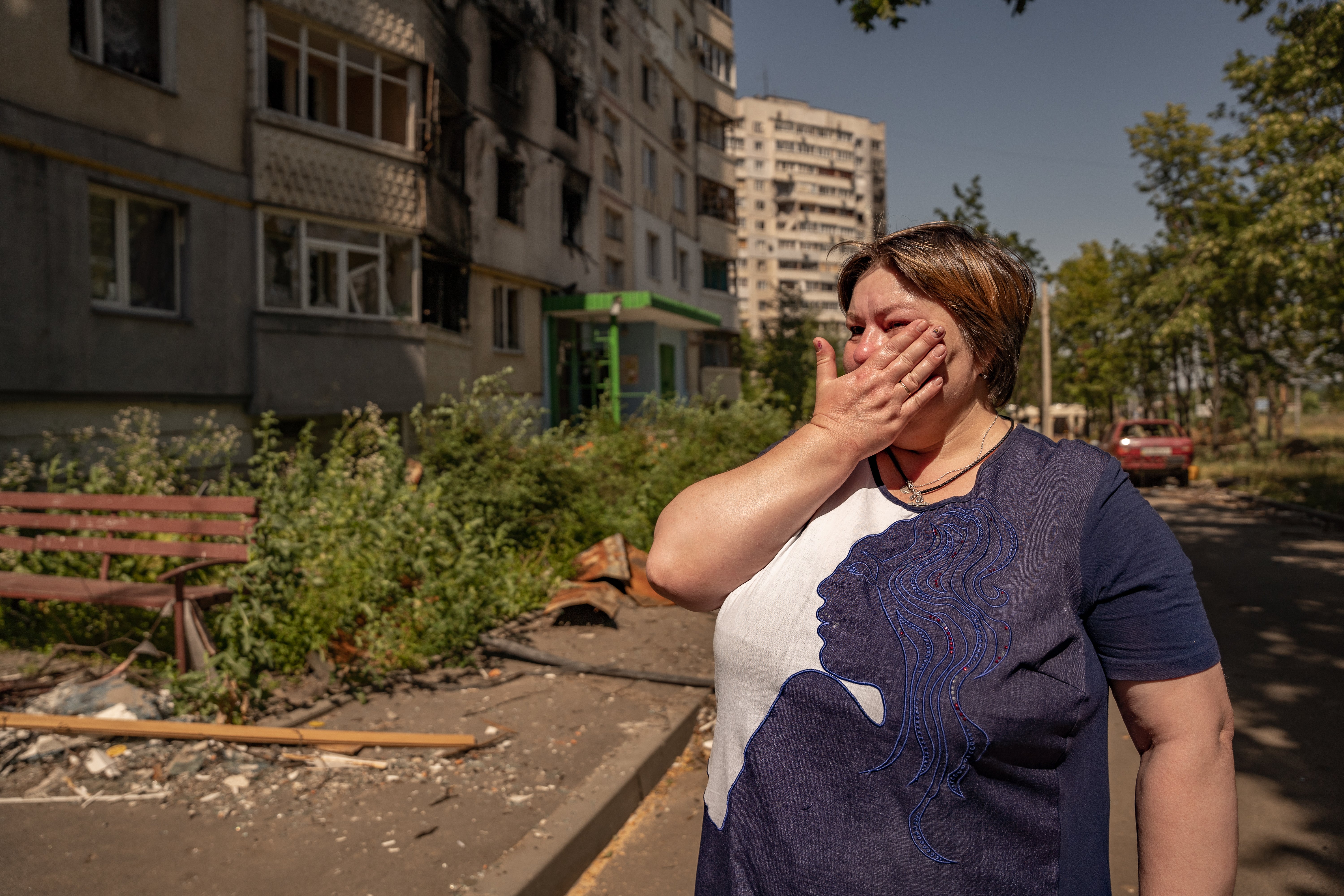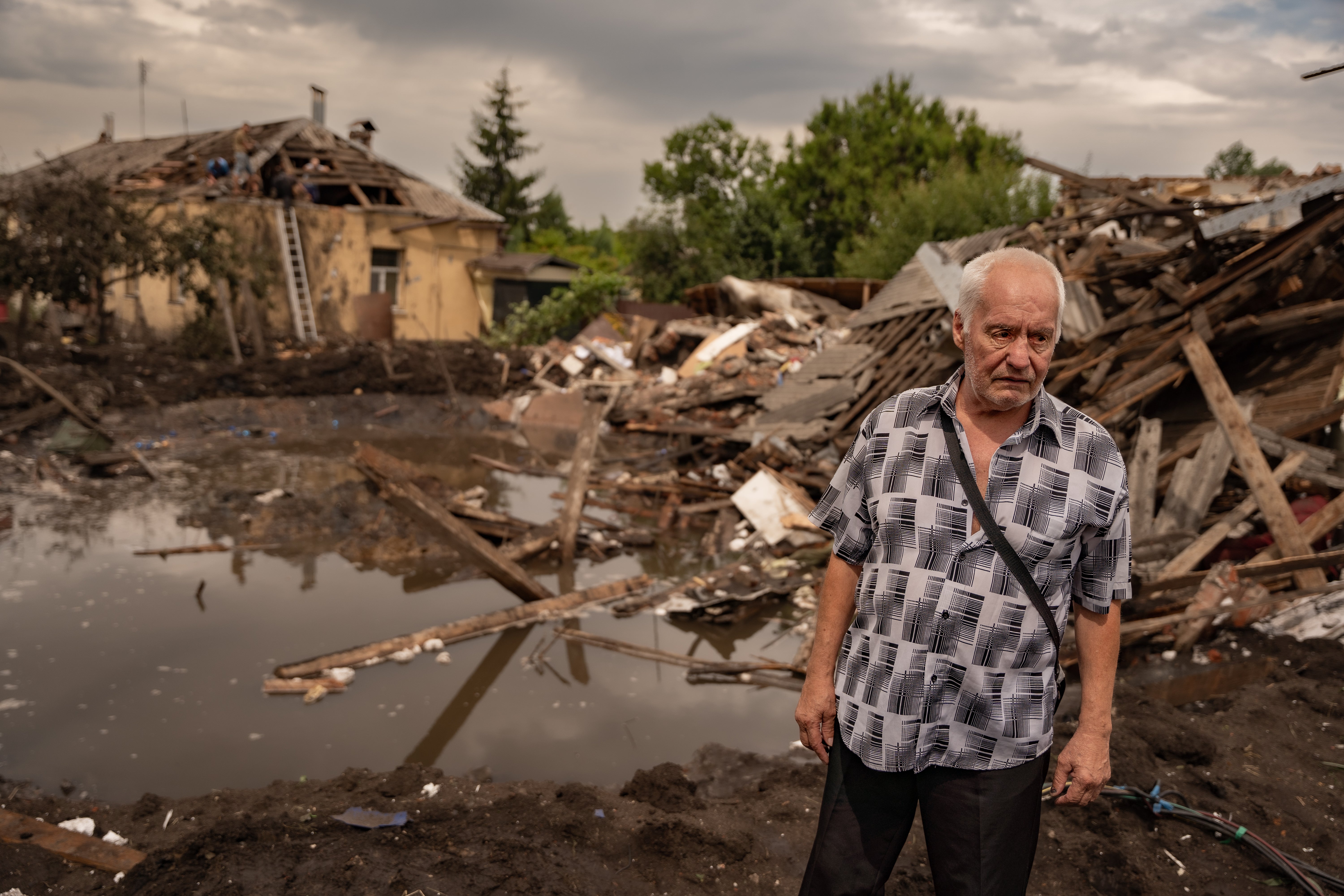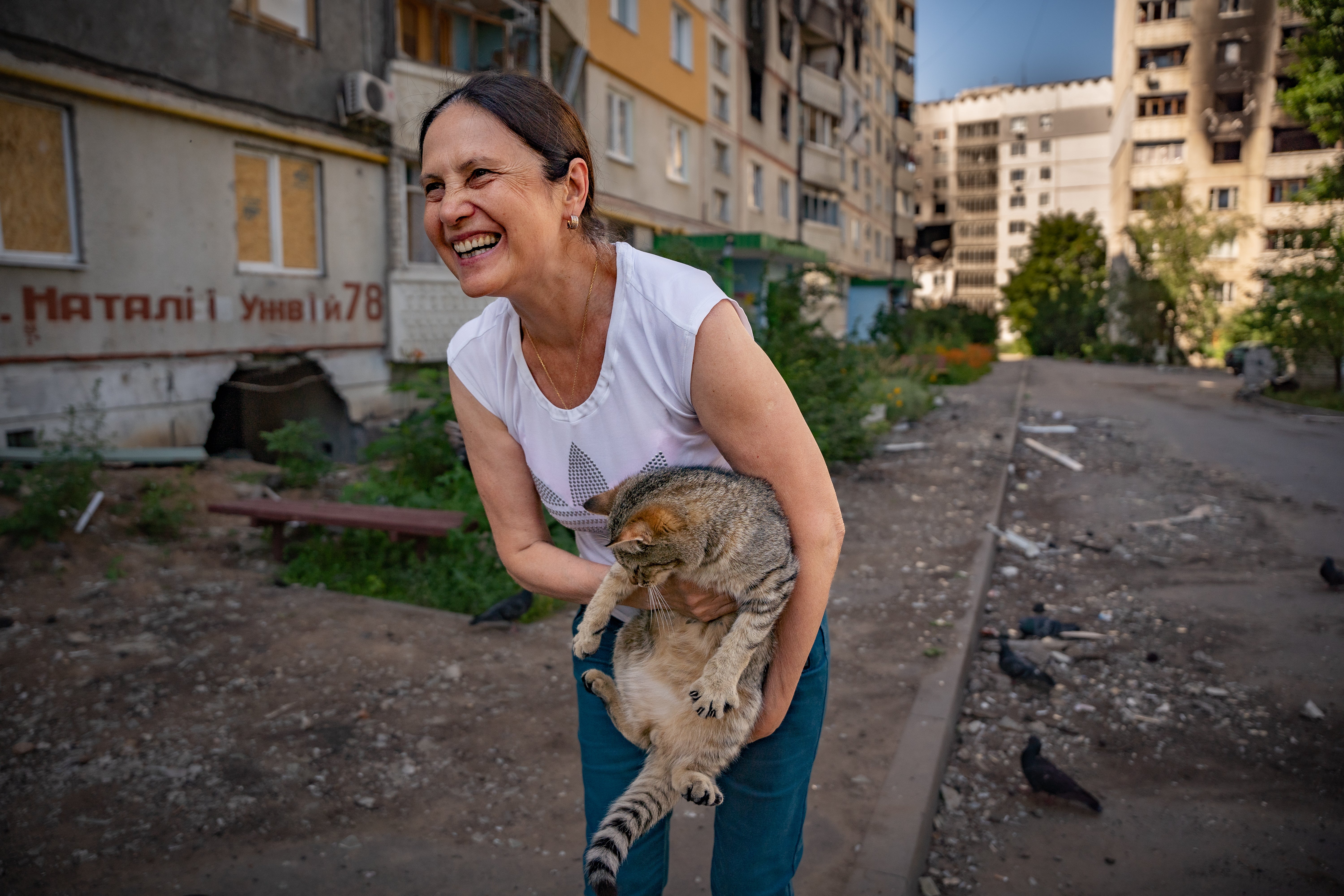‘We are still here’: The Ukrainian bombed three times by Russian forces and has somehow survived each one
On Sunday, Larissa’s latest place of refuge was struck by shelling, but again she dodged death. International correspondent Bel Trew reports from North Saltivka on an extraordinary tale of human survival


Larissa says she hopes lightning doesn’t strike twice. But in her case, it has struck at least three times.
The 60-year-old is from North Saltivka, one of the hardest-hit areas of Kharkiv, Ukraine’s second-largest city, that lies just a few miles from the Russian border.
Larissa fled her home in the northern district in March when it was bombed, and then moved to a nearby school, which was then subsequently hit.
On Sunday morning, another missile tore through the sky like a javelin, leaving a 15-metre-wide crater just a few paces from her latest shelter: a relative’s bungalow in what was supposed to be a quiet residential suburb south of the city.
“We just keep hoping a bullet doesn’t strike twice in the same place,” she says, knocking on wood, as dazed rescue workers and residents try to drain the swampy moonscape behind them. The crater stands next to the chewed-up remains of a home. The explosion, which security forces say was caused by a Russian Iskander ballistic missile, reverberated throughout the city.
“We heard no whistle, we had no warning. The house shook, the ground jumped, we could smell the powder of the missile,” the pensioner continues with a pause.
“But luckily, for some reason, we are still here.”

This deadly lottery is the daily reality for residents of Kharkiv, which had a pre-war population of nearly 1.5 million people. Every day there is a new missile strike and shelling – at least one was injured on Sunday. And it is particularly deadly in North Saltivka, which lies just a few miles from the front line.
The Soviet-era working-class neighbourhood was originally built for the city’s industrial workers and their families. It once housed half a million people and was apparently one of the largest neighbourhoods in Europe.
But now Russian positions are just a few miles away.
Despite being so close to one of three missile strikes which pounded Kharkiv on Sunday morning, Larissa and her husband Yuriy, 68, count themselves as lucky. This is because they can live rent-free in a relative’s house in a comparatively safer area than North Saltivka. They struggle to get by on a pension of just 2,000 Ukrainian hryvnia a month (£56). Rent for a one-bed flat is at least three times that amount a month.
“And so some people are returning to Saltivka because they cannot afford to rent any more. They have no choice but to go back,” she adds.
It is not much to return to: North Saltivka is a pock-marked ghost town without water, electricity or gas.
Russian forces held positions hemming in the city about a mile away from the neighbourhood for a few months earlier in the war. They have been pushed back by a successful Ukrainian counteroffensive into the countryside north of Kharkiv. But the issue is that Kharkiv, and North Saltivka in particular, is very much within artillery range, and it is still being pounded.
“We are shelled pretty much daily, and the night is particularly scary, there are explosions constantly,” says Valentina, 74, a retired engineer who returned to North Saltivka in May when she got the all-clear from the military. We meet her as she is sweeping up the debris from the latest strike. Incoming fire sounds – including a missile strike on the centre of Kharkiv – boom in the background.
We heard no whistle, we had no warning. The house shook, the ground jumped, we could smell the powder of the missile. But luckily, for some reason, we are still here
“The problem was we were living in a village with six people in one room and even that, we couldn’t afford,” she continues. Rent for that one room was 7,500 hryvnia a month (£220), more than two and a half times her monthly pension.
“Of course we had to come back, we couldn’t sustain that,” she adds.
She says eight people were so poor that they never even left the neighbourhood, and spent much of the last five months in the basement of her building.
Among them was an 85-year-old who has barely surfaced since the start of the war.
“There are now 20 people living in this block. Bit by bit people are coming back because they have to,” she explains with a shrug.
North Saltivka, is eerily empty. Shops are boarded up, closed or bombed, most apartment blocks have giant holes clawed out of them. Mutilated playgrounds are overgrown with weeds. Buildings yawn open, spilling belongings into the empty streets.
But amid the devastation, we stumble on Olena, 62, whose husband Serhiy, 58, has returned to live in the neighbourhood, where he found work as a plumber trying to fix the myriad broken pipes. Carrying a washing bowl full of personal items she has rescued, Olena says that there is still no infrastructure.
“People are effectively camping in their homes,” she says.
Svitlana, 50, who moved back in May with her husband, says that the lack of water, electricity and gas is worrying them ahead of the colder months.
“We’re worried about the winter ahead and how we will cope,” she says, taking us to her destroyed flat.
“And right now the shelling is unpredictable, it’s hard. But what else can we do?
“I don’t have work now, I was working at the tram station which was bombed.”

Together with her husband, they managed to convince the local general to reconnect the flat where they are staying to an electricity supply. It’s the only one with some power in the area. Their actual home is around the corner and still a blackened shell.
She says the military came to de-mine the buildings and remove unexploded ordinances, but rescuers still haven’t checked all the flats for dead residents.
“The next problem is what happened to the missing people. We know of at least four people who are unaccounted for from our area,” she adds.
One of them is an elderly pensioner who lived in her block, was handicapped and could not move to the shelter in time. Svitlana believes his body and the bodies of three others are still in their building a few doors down. Rescuers still haven’t managed to check all the buildings, she continues.
Her son now works for one of the initiatives trying to locate those who are potentially still under the rubble or who have been captured by Russian soldiers.
“My whole life is here, this is my home – how can I just leave?” she says in tears outside the bombed-out remains of her building.
“We are so worried about autumn and winter, we don’t know what our future will be, how we will survive.”






Join our commenting forum
Join thought-provoking conversations, follow other Independent readers and see their replies
Comments